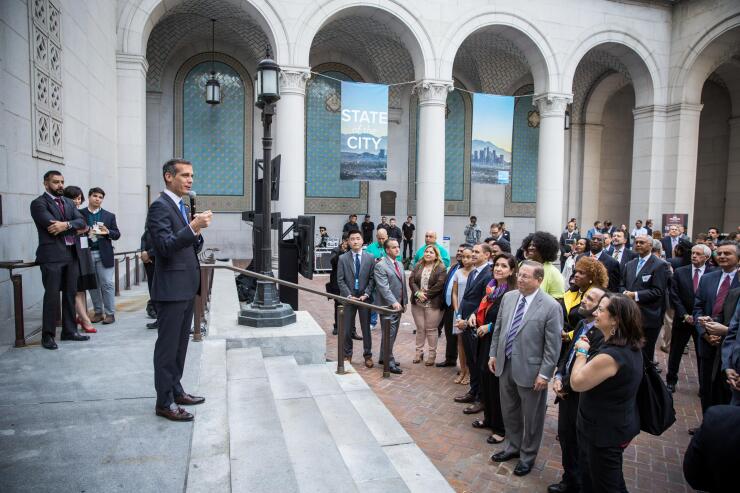LOS ANGELES — Los Angeles Mayor Eric Garcetti said he plans to escalate spending on homeless programs and triple housing production to enact a mandate from voters.
Garcetti unveiled his $9.2 billion fiscal 2017-18 spending plan Thursday in concert with his State of the City speech.
Voter approvals of tax increases for transportation projects and homeless programs enabled the mayor to increase spending in these key areas, he said.

The mayor’s budget closed a $263 million shortfall in the current year with $103 million in spending reductions achieved by leaving city employee positions vacant. The budget also anticipates $160 million in increased revenues.
The mayor in his budget proposal did not include the much-talked about proposal to issue a $60 million judgment obligation bond to pay for higher-than-anticipated settlements in city litigation and close the budget gap. The city council approved last month moving forward on a financing plan for a JOB, which council members said was to keep their options open.
“The budget doesn’t assume the proceeds or debt service,” said Matt Szabo, the mayor’s deputy chief of staff for budget and innovation. “But the council is still going through the process of authorizing the bonds – and the council will continue to evaluate.”
The budget balances without the bonds, Garcetti said, but the council will make a determination in coming weeks during budget discussions.
“It is the last thing we want to do, if we can avoid it,” the mayor said.
The fiscal 2017-18 budget includes $180 million for legal settlements, which Garcetti said might be more than needed, but the city wanted to be conservative.
Of the $176 million he budgeted for homeless programs, $122.4 million will go to build permanent housing with the remainder providing services such as temporary shelters and outreach.
That compares to the tens of millions a year the city had been spending to create an average of 300 new units a year, Garcetti said.
He expects the program to gain speed as time goes by.
“This year we are acquiring properties, so there will not be as much groundbreaking as in years to come,” Garcetti said, but emphasized the program will triple affordable housing production for homeless people.
City and county leaders launched separate campaigns last year to raise sales taxes through voter initiatives to deal with the county’s estimated 46,874 homeless people. Working together, city officials agreed to concentrate on spending to build housing for homeless people while the county will focus on services to help homeless people transition off the streets.
Voters approved Measure HHH, a property tax increase, expected to raise $1.2 billion to build 10,000 affordable housing units in November. The county’s effort, Measure H, a quarter-cent sales tax approved by voters in March, will raise an estimated $355 million a year for 10 years to provide transition services.
Measure M, a sales tax that will provide $120 billion over 40 years for transportation projects, was also approved by county voters in November.
The 46-year-old mayor spoke about how widespread homelessness has become since he was a child in his speech.
“When I was growing up, homelessness was mostly concentrated in Skid Row,” Garcetti said. “Today, there are people without shelter in just about every neighborhood.”
“As mayor, there’s no issue I spend more time on – because I believe that homelessness is the moral issue of our time,” he said.
The mayor also has asked the City Council to pass a fee on development that would be used to pay for affordable housing that he says would raise $100 million.
Garcetti said the city has made strides on the Back to Basics goals of his 2013 mayoral campaign promise “to make changes that Angelenos could see in their neighborhoods” by making improvements to streets and sidewalks. The budget also includes more funding along those lines in addition to the more than $800 million expected to be raised for Los Angeles County Metropolitan Transportation Agency Projects this year from Measure M, according to the mayor, who chairs Metro’s board.
Unlike the hotly contested race when he first ran for election, Garcetti ran virtually unopposed and won a second term last month with 81% of the vote.





